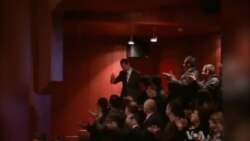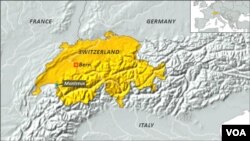LONDON —
After a flurry of diplomacy Monday that resulted in the United Nations withdrawing its offer for Iran to participate, the long-awaited second international peace conference on Syria is scheduled to convene in the Swiss resort town of Montreux on Wednesday and resume in Geneva later in the week.
United Nations Secretary-General Ban Ki-moon had invited Iran to participate, but the offer was withdrawn late Monday after the United States objected and Syria's main opposition group said it would not take part unless the offer was retracted.
Iran declined the invitation at the same time, saying it could not accept the communique from the previous Geneva Conference on Syria, held in June 2012, which calls for a political "transition." Iran is one of the main backers of Syrian President Bashar al-Assad.
But even before Monday's drama, expectations for the talks were low as the Syrian government and opposition factions - and their international backers - continue to have sharply different views of Syria's future.
With the West and Arab states supporting the opposition and Russia and Iran supporting the government, the two sides have fought to a stalemate, and have hardened their demands, according to Chris Doyle of the Center for Arab-British Understanding.
“Neither the regime nor the various, myriad opposition forces are yet in a position where they are yet ready to draw down from their maximalist positions,” he said.
That was evident in the days leading up to the conference, with Western officials saying Syrian president Bashar al-Assad must resign and Assad saying he has no intention of doing so.
The main opposition coalition only agreed to attend the conference at the last minute, and under intense Western pressure. Even so, the coalition is deeply divided and threatened to walk out if the discussion is diverted to just about anything other than Assad's removal.
The fighting has raged in Syria for nearly three years, leaving an estimated 100,000 dead and 8.5 million exiled or displaced - nearly half the country’s population. The United Nations has said more than nine million Syrians are in urgent need of aid, and many of them cannot be reached because of the fighting.
There are proposals for ceasefires, prisoner exchanges and humanitarian corridors.
David Butter of London’s Chatham House said this conference is not likely to make progress even on those issues, and procedural agreements might be the best that can be hoped for.
“If there is a framework that ultimately could bring the parties in, then that is better than nothing," he said. "I think that is just about as much as you can say for this process at the moment.”
Butter said that many of the opposition fighters have refused to send representatives to this conference, with the most militant threatening to retaliate against any group that attends.
“Any sort of settlement of the Syrian conflict will necessarily have to involve people who actually are on the ground and doing the fighting," he said. "None of the main groups on the ground are committed to any sort of negotiating process at the moment.”
Regional powers like Iran, as well as Saudi Arabia, Qatar and Turkey, further complicate the crisis, each with their own interests to protect. Chris Doyle said it is just not possible to satisfy all the myriad parties to the Syrian conflict.
“These actors have also got to come to terms with the fact that they are not going to realize all of their goals and they need to cool down the Cold War that has entrapped Syria, that has actually fueled the fighting,” he said.
The United Nations, which is hosting this conference, has long described the plight of the Syrian people as desperate, but experts say the conference is mainly about big power diplomacy and perhaps starting a process among the Syrian parties, with little expected in the way of concrete results to move toward ending the war or helping its victims.
VOA United Nations correspondent Margaret Besheer contributed to this report.
United Nations Secretary-General Ban Ki-moon had invited Iran to participate, but the offer was withdrawn late Monday after the United States objected and Syria's main opposition group said it would not take part unless the offer was retracted.
Iran declined the invitation at the same time, saying it could not accept the communique from the previous Geneva Conference on Syria, held in June 2012, which calls for a political "transition." Iran is one of the main backers of Syrian President Bashar al-Assad.
But even before Monday's drama, expectations for the talks were low as the Syrian government and opposition factions - and their international backers - continue to have sharply different views of Syria's future.
With the West and Arab states supporting the opposition and Russia and Iran supporting the government, the two sides have fought to a stalemate, and have hardened their demands, according to Chris Doyle of the Center for Arab-British Understanding.
“Neither the regime nor the various, myriad opposition forces are yet in a position where they are yet ready to draw down from their maximalist positions,” he said.
That was evident in the days leading up to the conference, with Western officials saying Syrian president Bashar al-Assad must resign and Assad saying he has no intention of doing so.
The main opposition coalition only agreed to attend the conference at the last minute, and under intense Western pressure. Even so, the coalition is deeply divided and threatened to walk out if the discussion is diverted to just about anything other than Assad's removal.
The fighting has raged in Syria for nearly three years, leaving an estimated 100,000 dead and 8.5 million exiled or displaced - nearly half the country’s population. The United Nations has said more than nine million Syrians are in urgent need of aid, and many of them cannot be reached because of the fighting.
There are proposals for ceasefires, prisoner exchanges and humanitarian corridors.
David Butter of London’s Chatham House said this conference is not likely to make progress even on those issues, and procedural agreements might be the best that can be hoped for.
“If there is a framework that ultimately could bring the parties in, then that is better than nothing," he said. "I think that is just about as much as you can say for this process at the moment.”
Butter said that many of the opposition fighters have refused to send representatives to this conference, with the most militant threatening to retaliate against any group that attends.
“Any sort of settlement of the Syrian conflict will necessarily have to involve people who actually are on the ground and doing the fighting," he said. "None of the main groups on the ground are committed to any sort of negotiating process at the moment.”
Regional powers like Iran, as well as Saudi Arabia, Qatar and Turkey, further complicate the crisis, each with their own interests to protect. Chris Doyle said it is just not possible to satisfy all the myriad parties to the Syrian conflict.
“These actors have also got to come to terms with the fact that they are not going to realize all of their goals and they need to cool down the Cold War that has entrapped Syria, that has actually fueled the fighting,” he said.
The United Nations, which is hosting this conference, has long described the plight of the Syrian people as desperate, but experts say the conference is mainly about big power diplomacy and perhaps starting a process among the Syrian parties, with little expected in the way of concrete results to move toward ending the war or helping its victims.
VOA United Nations correspondent Margaret Besheer contributed to this report.














